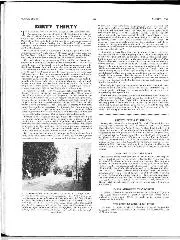
Dirty Thirty
The way to Hell, we are told, is paved with good intentions. The same may be true of roads in the Spelthorne division of the Parish of Sunbury in the…
THE NOTEK FOG LAMP TESTED
Low current consumption, a wide beam, and an absence of glare are three most desirable features in a fog lamp, and we found these present in a Marked degree in the Notek fog lamp. One of these appliances has been on test for several weeks on a MOTOR SPORT staff car, and has acquitted itself with credit under a variety of conditions.
The lens of the lamp is oval, curved and marked with vertical corrugations, and projects a fan-shaped beam of white light which is sufficiently wide to illuminate the hedges of a country road or even the kerbs of a by-pass. The value of this side illumination becomes evident when dense fog is met with; a small patch of kerb in front of the near-side front wheel is clearly lit up and, although this is rather hazardous unless a passenger can keep a lookout for oncoming traffic, in case of extremely bad visibility, the car can be run along the right-hand kerb with equal ease. Despite the widespread beam, there was no backreflection in the thickest of fog. Tested in light mist where it was impossible to proceed with the headlamps in the raised position, the Notek gave practically normal vision, and permitted of a speed
of 40 m.p.h. where other cars were down to half this speed.
45 m.p.h. can be maintained with the lamp in use as a traffic light, and there was a complete absence of glare. We tested this by standing seventy-five yards from the car, where the light is sufficient to read newsprint without difficulty, and then returning looking directly into the light. The beam never rises above the thighs, and the lamp can be tilted for use in fog without disturbing the fixing bolt. This is of the same size as that usually employed, and the Notek can be fitted in a quarter-of-an-hour.
The amount of light obtained on dry roads is quite astounding considering that the special Neron bulb fitted consumes only thirty-six watts in place of the usual sixty, but on black, wet surfaces the illumination is naturally somewhat reduced. For this reason if the lamp is to be employed on a fast car as an alternative to the headlights, we would suggest fitting a forty-eight-watt lamp. Whichever is used, there is no doubt that the Notek lamp is a highlyefficient accessory and one of the greatest value in the foggy weather, which seems to have set in permanently for the winter months.